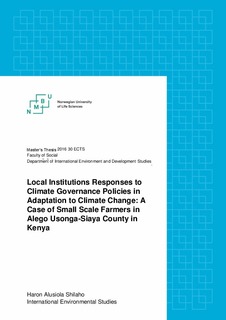| dc.contributor.advisor | Eriksen, Siri | |
| dc.contributor.author | Shilaho, Haron Alusiola | |
| dc.coverage.spatial | Kenya | nb_NO |
| dc.date.accessioned | 2016-11-21T11:40:05Z | |
| dc.date.available | 2016-11-21T11:40:05Z | |
| dc.date.issued | 2016-11-21 | |
| dc.identifier.uri | http://hdl.handle.net/11250/2422108 | |
| dc.description.abstract | Alego Usonga-Siaya County in Kenya can be considered a climate change vulnerable area with larger population dependent on substance and rain-fed farming and other social-economic activities. Drawing on national climate policy the study explore and analyse how vulnerable small scale farmers adapted more (adaptation+) to changes in local forms of institutions. The aim of the study is to gain more insights into roles of planned national climate state use policies and responses of village level institutions in adaptation in farming. The study used a qualitative methodological approach with semi-structured and group interviews, key informants and observation as main data collection methods. The study was based on five normative principles of sustainable adaptation. Research findings indicate that the nature of devolved climate policies and local forms of institutions interaction is critical for how sustainable adaptation can be supported. The adoption of seed crops and other policy interventions can potentially contribute to the adaptation process. The policy takes a distinct outcome vulnerability approach, opposite of the contextual vulnerability approach. Attributing local vulnerability to drought and flooding and low adaptive capacity is classical outcome vulnerability.
The study demonstrates that some efforts deployed by rural farmers and government to strengthen local adaptation and adaptive capacity through traditional practices and national policy interventions cannot be isolated from usual development pathways of carbon emissions from western models of development.
The study demonstrates that interaction between policy interventions and farmer practices supports adaptation process. To strengthen adaptation, local institutions responses to climate policies determine how interventions can be applied practically. However, development pathways may actually undermine the adaptation process and potentially increase the vulnerability of some farmers.
Nevertheless, the study concludes that policy devolution to some extent can limit local forms of institution adaptation responses to climate change. Local forms of institutions shape climate policies. However, climate policies have more influence in facilitating and shaping institutional changes for sustainable adaptation pathways. | nb_NO |
| dc.language.iso | eng | nb_NO |
| dc.publisher | Norwegian University of Life Sciences, Ås | |
| dc.rights | Navngivelse-Ikkekommersiell-IngenBearbeidelse 3.0 Norge | * |
| dc.rights.uri | http://creativecommons.org/licenses/by-nc-nd/3.0/no/ | * |
| dc.subject | Adaptation+ (plus) | nb_NO |
| dc.subject | Climate policy | nb_NO |
| dc.subject | More sustainable adaptation pathways | nb_NO |
| dc.title | Local institutions responses to climate governance policies in adaptation to climate change : a case of small scale farmers in Alego Usonga-Siaya County in Kenya | nb_NO |
| dc.type | Master thesis | nb_NO |
| dc.subject.nsi | VDP::Social science: 200::Social anthropology: 250 | nb_NO |
| dc.subject.nsi | VDP::Agriculture and fishery disciplines: 900 | nb_NO |
| dc.source.pagenumber | 93 | nb_NO |
| dc.description.localcode | M-IES | nb_NO |

